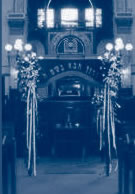|
SEDRA: Devarim Hertz Chumash p. 736 Deuteronomy
Chap. 1
This week's Sedra is generously sponsored by Andrew Firestone.
SYNOPSIS:
Sedra Devarim, is the opening section of the book of Devarim
derived from the opening words "Eleh ha'd'varim".
"These are the words". It is also called "Mishneh
Torah" - the Torah repeated, as it reviews the major
incidents and principles of much of the Torah in the form
of the "Three Farewell Discourses" of Moses.
The Sedra opens with the place (near to the Promised Land)
and date (the fortieth year) of the first farewell discourse.
Moses reviews the events of the previous forty years. He recalls
how at Mount Choreb (Sinai) G-d had commanded them to break
camp and begin their journey to their destination, the promised
land of Canaan. Moses then relates that he soon realised he
was unable to bear the burden of the leadership alone and
so he delegated authority to judges and administrators to
assist him. This verse beginning with the word "Echa"
is sung in the melody of The Book of Lamentations (called
`Echa') since this Sedra always occurs on the Shabbat before
Tish'a B'av.
When they reached Kadesh Barnea spies were sent to Canaan.
They reported on the excellence of the land but caused the
people to lose heart through their reference to the impregnability
of the cities, and the powerful population including giants.
This loss of faith resulted in the period of wandering in
the wilderness being extend to 40 years, till virtually all
the older generation had died. Only Joshua and Caleb of the
older generation would enter the land, since as spies, they
had reported positively.
The Israelites remained at Mount Seir for a long time. They
were then to cross the land of Edom, but were to refrain from
any hostilities since the Edomites were the descendants of
Esau and this land had been promised to them. Likewise they
were not to attack Moab or Amon since these lands had been
promised to the descendants of Lot, Abraham's nephew.
However, on crossing the river Arnon the Israelites began
the conquest of the Amorite kingdoms. They defeated Sichon
King of Cheshbon, who had denied them passage through his
land and the same fate befell Og, King of Bashan. These campaigns
resulted in decisive defeats and the dread of the Israelites
began to spread among the local peoples as G-d had promised.
The land of the Amorites was promised to the tribes of Reuben,
Gad and half of the tribe of Manasseh on condition that they
participate in the advance guard of the conquest of the land
together with the rest of the Israelites. Joshua was strongly
encouraged not to fear the nations living in the promised
land for G-d Himself would fight for them.
HAPHTORAH HERTZ CHUMASH P 750 Isaiah Chap 1.
As mentioned above, this Sedra always precedes Tish'a B'av
and is called "Shabbat Chazon" since the Haphtorah,
third of the Haphtorot of Rebuke opens with the word : "Chazon
Yeshayahu - the vision of Yeshayahu".
The dire warnings and accusations in the haphtorah have been
selected as a warning to Israel for all time of the tragic
results of moral and ethical degradation. While G-d has been
a Father of His people, Israel has displayed gross ignorance,
disobedience and ingratitude. Only G-d's kindness has prevented
the corruption from leading to destruction on the scale of
Sodom and Gomorrah. The capital, Jerusalem, the ruler and
the sacrificial system have been corrupted and are a source
of loathing. Penitence is available and strongly urged. Justice
should be reinstituted for the `faithful city' has degenerated
into `a harlot'. Nevertheless all hope is not lost for those
who will repentantly return in justice and faithfulness.
The Haphtarah is chanted on the melody of "Echa"
- Lamentations.
TELL ME RABBI .....TISH`A B'AV
This saddest and most tragic day in the Jewish calendar is
observed as a complete fast. As on Yom Kippur we abstain from
eating, drinking, washing and bathing, wearing leather shoes,
shaving, sexual relations and anointing (including cosmetics).
Except for such books as Lamentations, Job, Talmudic selections
dealing with the destruction of the Temple and the laws of
mouning, we refrain even from Torah study since "The
precepts of the Lord are right, rejoicing the heart"
(Psalms 19:9) It is usual to avoid all work for at least the
first half of the day and to spend the time on low stools
as in Shiva (mourning) reading the kinot.
The first tragic Tisha B'Av occurred on the day the spies
returned to Moses and the Israelites with their evil report
about the land of Israel.
The day commemorates the destruction of the First Temple in
586 BCE by the Babylonians and also the Second Temple in 70
CE. by the Romans. This was a disaster of tragic proportions
not only religious in nature, but also signifying the loss
of Jewish Independence and exile. Subsequently Tish'a B'av
also became identified with the countless tragedies, oppression
and cruelty which characterised Jewish existence over centuries.
In spite of Israel's independence in 1948 and the reunification
of Jerusalem in 1967 for the first time since 70 CE, the significance
of Tish'a B'av has nevertheless been reaffirmed by thinkers
and scholars : the Temple is not yet restored and the Temple
Mount was appropriated to build a major Islamic shrine; there
is no more appropriate occasion in the year to memorialise
and mourn over all those occasions in our long history which
were steeped in sorrow, suffering, torture and death culminating
in the Holocaust in Europe.
EVENING SERVICE
Followed by Maariv for Tisha B'Av and Echa. The synagogue
lights are dimmed and the Ark Curtain is put aside to create
a mournful atmosphere. After Maariv The Book of Lamentations
by the prophet Jeremiah is read, followed by Kinot - dirges.
SHACHARIT SERVICE:
The Tallit and Tephillin being religious adornments of beauty
are not worn. The service follows the regular weekday pattern
with additions for fast days. The Torah is read and the service
is followed by the reading of Kinot - dirges.
MINCHA SERVICE:
The Tallit and Tephillin are worn; the regular Mincha service
with additions for fast days and Torah reading ensues
BACK TO SHABBAT SHALOM
TABLE
|








